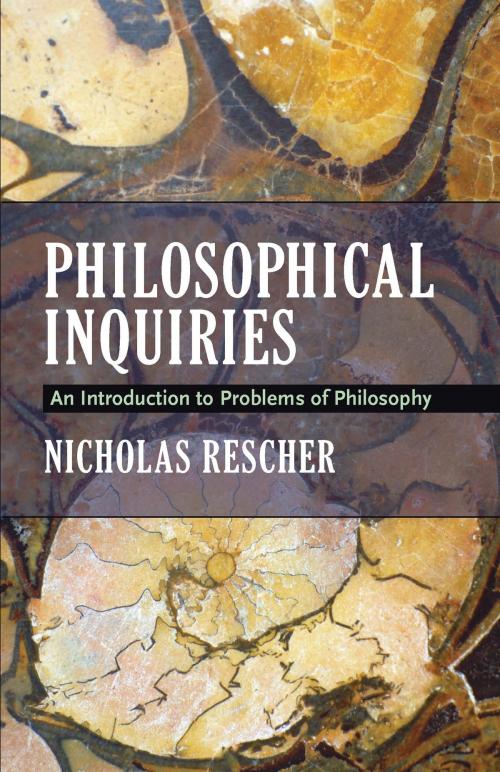Philosophical Inquiries
An Introduction to Problems of Philosophy
Nonfiction, Religion & Spirituality, Philosophy| Author: | Nicholas Rescher | ISBN: | 9780822973782 |
| Publisher: | University of Pittsburgh Press | Publication: | May 15, 2010 |
| Imprint: | University of Pittsburgh Press | Language: | English |
| Author: | Nicholas Rescher |
| ISBN: | 9780822973782 |
| Publisher: | University of Pittsburgh Press |
| Publication: | May 15, 2010 |
| Imprint: | University of Pittsburgh Press |
| Language: | English |
In Philosophical Inquiries, Nicholas Rescher offers his perspectives on many of the foundational concerns of philosophy and reminds us that the purpose of philosophy is to “question the questions.” Rescher sees the need to inquire as an evolutionary tool for adapting to a hostile environment and shows how philosophy has thus developed in an evolutionary fashion, building upon acquired knowledge and upon itself. In a historical thread that informs and enriches his overview, Rescher recalls the contributions of Aristotle, Plato, Plotinus, Kant, Hegel, Leibniz, Laplace, Bertrand Russell, and others.
Among his many topics, Rescher discusses knowledge and the unattainablity of absolutes, skepticism and its self-defeating nature, the limits of science vs. the limits of cognition, refuting reality as mind-independent, and idealism and divining our role in nature. He considers the universe and intelligence as the product of intelligent design, science and religion as non-conflicting and purposeful pursuits, and determinism and other fallacies surrounding the concept of free will. Rescher views morality in its hierarchal structure, its applicability to human coexistence, and its ontological commitment to the enhancement of value for ourselves and our world. He examines questions of authority and the problem of judging past actions or knowledge by present standards. Overall, he argues for philosophy as an unavoidable tool for rational, cogent responses to large questions.
In Philosophical Inquiries, Nicholas Rescher offers his perspectives on many of the foundational concerns of philosophy and reminds us that the purpose of philosophy is to “question the questions.” Rescher sees the need to inquire as an evolutionary tool for adapting to a hostile environment and shows how philosophy has thus developed in an evolutionary fashion, building upon acquired knowledge and upon itself. In a historical thread that informs and enriches his overview, Rescher recalls the contributions of Aristotle, Plato, Plotinus, Kant, Hegel, Leibniz, Laplace, Bertrand Russell, and others.
Among his many topics, Rescher discusses knowledge and the unattainablity of absolutes, skepticism and its self-defeating nature, the limits of science vs. the limits of cognition, refuting reality as mind-independent, and idealism and divining our role in nature. He considers the universe and intelligence as the product of intelligent design, science and religion as non-conflicting and purposeful pursuits, and determinism and other fallacies surrounding the concept of free will. Rescher views morality in its hierarchal structure, its applicability to human coexistence, and its ontological commitment to the enhancement of value for ourselves and our world. He examines questions of authority and the problem of judging past actions or knowledge by present standards. Overall, he argues for philosophy as an unavoidable tool for rational, cogent responses to large questions.















